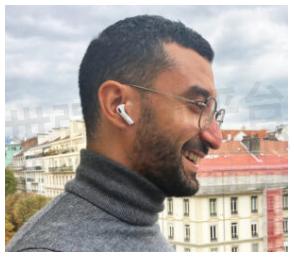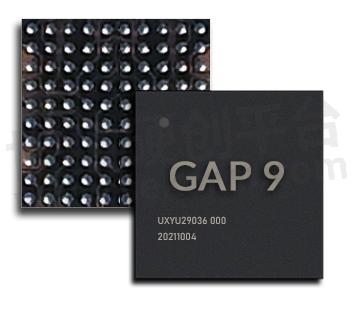Enabling ANC in Open-Ear Earbuds Beyond Apple with GreenWaves GAP9 AI+DSP Processor




Open-ear earbuds are an emerging design that has recently gained much visibility with the launch by Apple of their AirPods 4. The open-ear design provides comfort for extended use and enhances situational awareness by allowing ambient sound to enter the ear canal. As people wear earbuds for increasingly longer hours, open-ear designs are gaining traction, particularly in Asia.


Active Noise Cancellation (ANC) is now an anticipated feature in most earbuds. However, implementing ANC in open-ear designs is a real challenge, which Apple claims to have solved for loose-fit designs for the first time with the AirPods 4 thanks to their proprietary H2 processor. The effectiveness is half that of their sealed AirPods Pro 2. The primary difficulties in implementing Active Noise Cancellation (ANC) for open-ear designs are multifaceted:
1. Noise Cancellation: ANC involves both passive and active methods. In an open-ear design, passive cancellation is by definition almost nonexistent, allowing more external noise to leak into the ear.
2. Anatomical Variations: Each person has a unique ear shape, causing variations in how external noise leaks into the ear.
3. Environmental Sensitivity: The effectiveness of ANC is highly sensitive to environmental changes. For example, a gust of wind can create additional noise, and the ANC system must quickly adjust to compensate for it.
As a high-gain closed-loop system with such highly variable externalities, the system’s stability margin must be closely monitored and adjusted within a very tight timeframe to avoid howling departures. To achieve this goal, a neural network trained on corresponding situations has been proven to be far more effective than classic DSP solutions. Considering the targeted ANC bandwidth, the latency of the adaptation loop must be sub-millisecond, which in turn poses an architectural challenge for the processor.

By uniquely meeting this sub-millisecond latency requirement, the ultra-low-latency shared memory AI+DSP processor GAP9 enables brands, beyond Apple, to implement active noise cancellation (ANC) in open-ear designs.
Specifically, the GAP9 runs a highly reactive neural network that monitors the howling margin every millisecond and dynamically triggers the re-parameterization of the ANC graph running on GAP9’s ultra-low-latency Smart Filtering Unit.
The GAP9’s architecture allows for the seamless integration of multiple advanced features in addition to ANC such as AI-ENC, AI-transparency or AI- F2F denoising.
A processor is only as valuable as the software that runs on it. Our strategic partner Orosound Labs is among the very few companies that master AI-controlled active noise cancellation and reduction technologies, among other leading-edge features. Orosound Labs has been recognised by Frost & Sullivan as the first to market in delivering effective active noise cancellation and uplink noise reduction for open-ear headphones. Our collaboration has culminated in a full solution integrating their advanced features on GAP9. This joint offer drastically shortens the development of high-end hearables including open-ear designs.
ANC in open-ear TWS running on the GAP9 processor is commercially available and represents a crucial feature leap for vendors that defines the next generation of open-ear designs.
- +1 Like
- Add to Favorites
This document is provided by Sekorm Platform for VIP exclusive service. The copyright is owned by Sekorm. Without authorization, any medias, websites or individual are not allowed to reprint. When authorizing the reprint, the link of www.sekorm.com must be indicated.
Recommend
Application of Yangxing Technology Differential Crystal Oscillator in High-definition Video Processor
2024-01-12 - Application solution Article Video processor devices are commonly used devices in high-definition digital signal processing, and they play an important role in the transmission and conversion of today‘s high-definition video data.
GreenWaves Building Occupancy Management Solution Using the TensorFlow Object Detection API
2024-09-12 - Application solution Article This paper mainly introduces GreenWaves‘ introduction of a head count solution for intelligent building system occupancy management, and introduces its application scenarios and product advantages.
GreenWaves Processor GAP9 Achieves the Lowest Energy Consumption on All MLPerf™ Tiny v1.0 Benchmarks
2024-08-09 - Product Introduction GreenWaves designs highly efficient and easy to program processors that interpret and transform rich data sources using AI and digital signal processing in highly energy constrained devices. Our GAP9 processor enables new-to-world features in hearable and IoT products.
GreenWaves Unveils Groundbreaking Ultra-Low Power GAP9 IoT Application Processor for the Next Wave of Intelligence at the Very Edge
2024-08-18 - Product Introduction GAP9 combines architectural enhancements and an industry-leading Global Foundries 22nm FDX semiconductor process to deliver a peak cluster memory bandwidth of 41.6 GB/sec and up to 50 GOPS combined compute power at an overall power consumption of 50mW.
GreenWaves Technologies Unveils GAP8 IoT Application Processor, Enabling Groundbreaking Embedded Artificial Intelligence at the Very Edge
2024-08-15 - Product Introduction GreenWaves Technologies Unveils GAP8 The Industry’s Lowest Power IoT Application Processor, Enabling Groundbreaking Embedded Artificial Intelligence at the Very Edge.
GAP9 Evaluation Hardware Overview
March, 2022 - Evaluation Board User's Manual
GAP9,GAP9_EVK,GAP9MOD
GAP9-based TWS/Headphones Hardware Architectures with Implementation Guidelines
Nov. 3rd, 2023 - Application note & Design Guide
GAP9
GreenWaves Technologies Licenses Intrinsic ID Hardware Root of Trust for RISC-V AI Application Processor
2024-08-20 - Product Introduction GreenWaves’ pioneering RISC-V-based IoT application processors enable the cost-effective development, deployment and autonomous operation of intelligent, battery-operated sensing devices that capture, analyze, classify and act on the fusion of rich data sources such as images, sounds or vibrations at the very edge of the network.
GreenWaves Technologies GAP9 Enabling new dimensions in ultra-low power edge computing
August 7, 2024 - Supplier and Product Introduction
GAP9
查看更多版本GreenWaves Technologies Partners with Open-Silicon to develop Industry’s First IoT Processor Based on PULP and RISC-V
2024-08-20 - Product Introduction Open-Silicon, a system-optimized ASIC solution provider, today announced it was selected by GreenWaves Technologies to develop GAP8, the industry’s first IoT processor. GAP8 is built on the open source Parallel Ultra Low Power (PULP) and RISC-V ISA projects. Open-Silicon is providing GreenWaves Technologies with the complete RTL-to-physical design custom SoC implementation that is required to transform this smart IoT concept into working silicon in volume production.
Electronic Mall
 Auth. Dist.
Auth. Dist.
 Auth. Dist.
Auth. Dist.
 Auth. Dist.
Auth. Dist.
 Auth. Dist.
Auth. Dist.
 Auth. Dist.
Auth. Dist.
Integrated Circuits
Discrete Components
Connectors & Structural Components
Assembly UnitModules & Accessories
Power Supplies & Power Modules
Electronic Materials
Instrumentation & Test Kit
Electrical Tools & Materials
Mechatronics
Processing & Customization











































































































































































































































































































































































































































































































































































































































































































































































































































































































































































